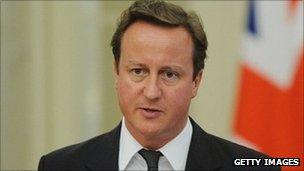Cameron urges G20 to stimulate recovery
- Published

David Cameron was among the signatories urging the US and eurozone to take action
The UK has joined five other G20 countries in calling for coordinated action from the world's leading nations stimulate economic growth.
Prime Minister David Cameron put his name to a letter also signed by the leaders of Australia, Canada, Indonesia, Mexico and South Korea.
It warns that recovery will be "difficult", while there is "limited room for manoeuvre".
The leaders insist an agreement must be reached at the G20's November summit.
The letter, not signed by the US or any eurozone state, urges swift action to resolve the debt crisis in the single currency area and for measures from Washington to put public finances on a sustainable path.
South Africa was involved in discussions about the letter and is understood to share many of the concerns voiced in it, but decided at a late stage that it was not ready to sign up.
'Reverberations'
"For many advanced economies the path out of the deep and prolonged recession will be difficult," warns the letter. "This will impact on growth in emerging markets, and there is more limited room for manoeuvre than in 2009."
The letter is addressed to Nicolas Sarkozy, the President of France, which is currently G20 president.
Mr Sarkozy said on Wednesday that the organisation's summit in the southern French resort of Cannes in November should be used to help the world find a way back to economic growth.
The letter backs his call, arguing this will require G20 leaders to act together in a coordinated way to address the issues which relate to their own countries - whether in reducing debt, tackling trade imbalances or strengthening banking systems.
Barriers to progress on restoring growth are now political as much as economic, it says.
Cannes will provide an opportunity for G20 members - who together represent 85% of the world economy - to "commit to each other to take the actions we know are necessary".
'Danger zone'
The letter says the "reverberations" of the 2008 financial crisis are still being felt, warning: "We need decisive action to support growth, confidence, and credibility.
"We have not yet mastered the challenges of the crisis. Global imbalances are rising again. External risks to the stability of our banks and our economies are reaching pre-crisis levels. And volatile and high energy prices are hurting our citizens and acting as a drain on world growth.
"At the same time, the confidence of citizens, businesses, and markets has been damaged due to the lack of visible political will: this in itself is holding back the recovery."
Meanwhile, world stock markets have dropped sharply after a series of grim warnings over prospects for the global economy.
Christine Lagarde, head of the International Monetary Fund, said the economic situation was entering a "dangerous place".
Earlier, the president of the World Bank, Robert Zoellick, said the world's economy was "in a danger zone".
The comments came after the Federal Reserve warned that the US economy faced "significant downside risks".
On Wednesday, the Bank of England said members of its Monetary Policy Committee had considered a new round of quantitative easing to pump money into the economy.